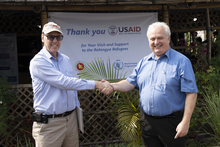Joint Government And WFP Programme Helps Ultra-Poor Cope Better With Effects Of Climate Change
The study, launched Sunday, evaluates a joint programme run by the Local Government Engineering Department (LGED) and the United Nations World Food Programme (WFP) to help rural populations cope with the effects of climate change. It focuses on ultra-poor people, who are particularly vulnerable to these risks, and finds that those enrolled in the programme are less likely to adopt detrimental coping strategies than those who do not.
Bangladesh is one of the most vulnerable countries to natural disasters and climate change, due to low-lying coastal regions and increasingly extreme weather conditions such as cyclones, floods and droughts. Significant swathes of the population still live with worrying levels of food insecurity, especially among the ultra-poor, who lack the means to adapt to natural hazards.
The Enhancing Resilience to Natural Disasters and the Effects of Climate Change programme started in 2011 as part of a joint initiative between the Government of Bangladesh and WFP. The package of interventions for participants includes community infrastructure work, training on disaster preparedness, capacity building, business development training and a cash grant to women for investment.
“The findings are highly encouraging,” said Christa Räder, WFP Representative and Country Director in Bangladesh. “Now we have a much better understanding of what kinds of programmes we have to deliver in order to stop families from applying negative coping strategies after a disaster.”
“We want to enhance the resilience of our people and so this is an important report because it provides some evidence on how this can be achieved.” said the Secretary Ministry of Disaster Management and Relief Mr. Md. Shah Kamal.
The evaluation showed that programme participants are more resilient than people of similar demographics who were not enrolled in the programme. The participants and their household members are 5-16 percent less likely to engage in detrimental coping strategies when faced with shocks like flooding and loss of livestock. The report also shows that participating households recovered more quickly from the five most common types of shocks (serious illness, cyclone, death of ducks and hens, loss of livestock and flooding). Finally the report showed that programme participants have a statistically significant higher income level than their unenrolled counterparts. They also tended to have more savings and fewer loans.
The full evaluation report, is commissioned by WFP and led by an external research team of the International Centre for Tropical Agriculture (CIAT) and the Development Research Initiative (DRI) can be found here. It is part of the Climate Adaptation Management and Innovation Initiative (C-ADAPT), which aims to develop analysis to inform programming and decision-making related to climate-induced food insecurity. C-ADAPT is funded by the Government of Sweden.
# # #
About WFP
WFP is the world's leading humanitarian agency fighting hunger worldwide, delivering food assistance in emergencies and working with communities to improve nutrition and build resilience. Each year, WFP assists some 80 million people in around 80 countries.
Follow us on Twitter @wfp_media and @wfp_asia
For more information please contact (email address: firstname.lastname@wfp.org):
Christa Räder, Representative, WFP Bangladesh, Tel. christa.rader@wfp.org
Line Sofie Adser, Communications Officer, WFP Bangladesh, linesofie.adser@wfp.org
Shah Mohammad Ashraful Amin, Senior Programme Officer, WFP Bangladesh, ashraful.amin@wfp.org

